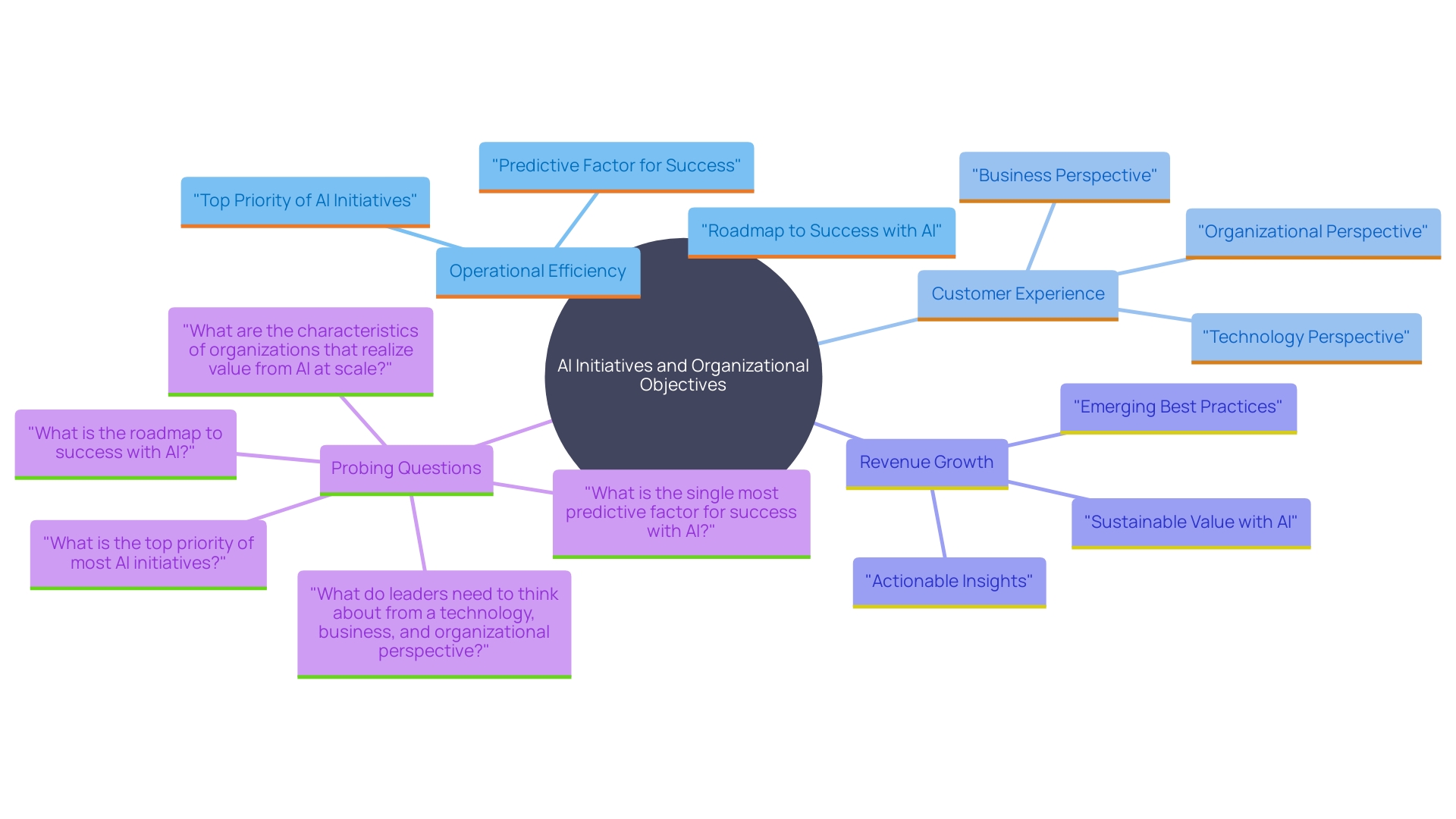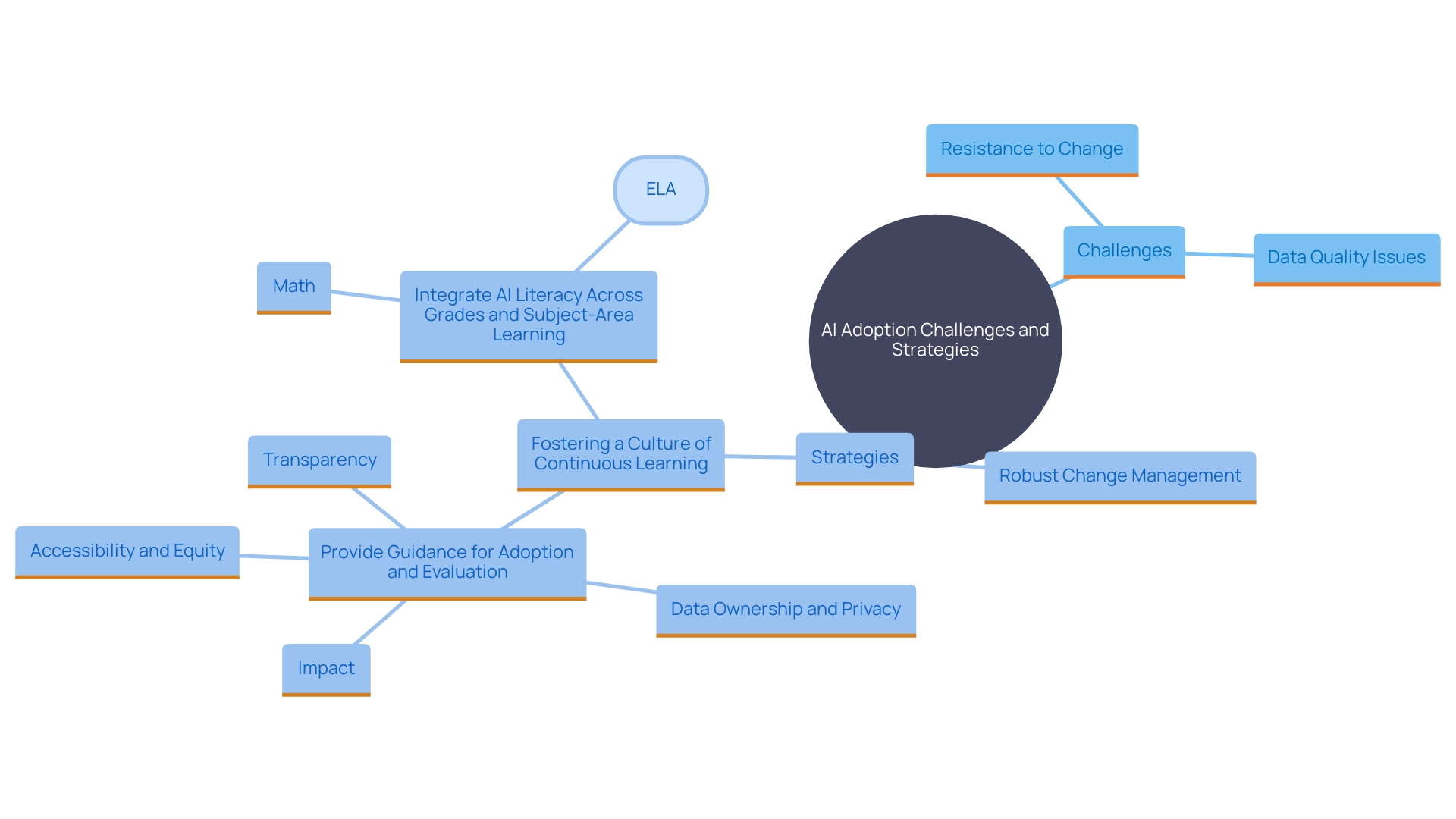Introduction
In the dynamic landscape of modern business, the role of AI business strategists has never been more critical. These professionals serve as the vital bridge connecting advanced technological capabilities with strategic business objectives, ensuring that enterprises can effectively harness the power of AI. By integrating deep technical expertise with strategic acumen, AI business strategists enable organizations to not only embrace innovation but also drive sustainable growth and maintain a competitive edge.
Recent surveys highlight the profound impact of strategic AI integration on various business metrics, including revenue predictability, cost efficiency, customer satisfaction, and operational consistency. With AI’s adoption rates soaring in key areas such as marketing, sales, and product development, the imperative for businesses to develop comprehensive AI policies has become increasingly clear. The insights of industry experts underscore the necessity for robust scenario planning and the transformation of trust into a lasting organizational asset.
AI business strategists play a pivotal role in navigating the complexities of AI adoption, ensuring that enterprises can leverage these technologies to achieve their strategic goals. Their dual expertise in technical and strategic realms makes them indispensable in today’s fast-evolving business environment, driving meaningful progress and innovation.
The Importance of AI Business Strategists
AI corporate planners are vital in contemporary organizations, serving as the key connection between advanced technology and strategic objectives. Their role is indispensable in overcoming the challenges of AI adoption, ensuring that companies leverage these technologies to drive both innovation and growth. By combining deep technical knowledge with strategic insight, AI strategists enable organizations to maintain a competitive edge in a data-centric world.
A recent survey involving over 1,300 corporate and technology decision-makers highlighted the importance of strategic AI integration. The findings pointed out that AI adoption significantly impacts revenue predictability, cost efficiency, customer satisfaction, and overall operational consistency. For instance, AI’s highest adoption rates are seen in marketing and sales (34%) and in product or service development (23%), areas crucial for organizational success.
Moreover, the Norges Bank Investment Fund has underscored the need for companies to develop comprehensive AI policies. While not every board requires an AI specialist, a collective understanding of Ai’s significance and strategic implementation is vital. This approach aligns with the insights of experts like Art Kleiner, who emphasizes the importance of robust scenario planning and turning trust into a lasting organizational asset.
AI professionals, therefore, play a crucial role in ensuring that organizations can navigate the complexities of AI and harness its potential to achieve sustainable competitive advantage. ‘Their expertise in both the technical and strategic realms is what makes them invaluable in today’s rapidly evolving commercial environment.’.

Key Responsibilities of an AI Business Strategist
An AI corporate planner plays a crucial role in changing how organizations utilize technology to reach their objectives. They start by conducting a thorough assessment of the current technological landscape, identifying gaps, and pinpointing opportunities for AI integration. For instance, companies like Creative Dock have experienced a 70% rise in revenue by strategically incorporating AI to enhance their operations and service portfolios.
These strategists ensure that AI initiatives are technically feasible and financially viable. This involves evaluating data requirements and the potential scalability of AI models. They collaborate closely with both IT and operational units to ensure that AI projects align with the organization’s mission and objectives. ‘The significance of this role is emphasized by the necessity for a systematic framework for assessing, experimenting with, and prototyping new concepts, as highlighted in recent studies on model innovation in the age of AI.’.
Moreover, AI enterprise planners promote decision-making based on data. They help establish robust frameworks that allow for the effective implementation of AI solutions. This approach not only improves customer satisfaction and loyalty through personalized services but also enhances safety and quality control across various industries. For example, AI-enabled quality assurance systems are revolutionizing manufacturing by increasing the speed and precision of quality checks.
In essence, an AI enterprise planner is instrumental in ensuring that AI initiatives are not only feasible and aligned with organizational goals but also drive meaningful progress and innovation.
Aligning AI Initiatives with Business Goals
Effectively aligning AI initiatives with organizational objectives is crucial for maximizing the value of AI investments. AI strategists work closely with leadership to define clear objectives and metrics for success. For instance, refining eligibility criteria for clinical trials illustrates this alignment process. Too narrow criteria can hinder participant enrollment, while too broad criteria can inflate variability and costs; AI can estimate patient eligibility to balance these factors effectively.
Strategists ensure AI projects are tailored to meet specific organizational needs, whether improving operational efficiency, enhancing customer experiences, or driving revenue growth. According to a survey by Ipsos involving over 1,300 decision-makers in technology, the single most predictive factor for AI success is the clear definition of goals and metrics. This alignment not only enhances the likelihood of project success but also encourages a culture of innovation within the entity.
Moreover, organizations that derive value from AI at scale often begin by asking probing questions to identify priorities and desired outcomes across all areas. These questions might include: What are our key sources of revenue, and how could AI make these more predictable and repeatable? Where are our most significant costs, and how could AI drive efficiency? What pain points detract from the customer experience, and how could AI ease or enhance interactions?
‘The journey begins with establishing financial objectives—whether reducing operating costs or generating more revenue—and then analyzing each operational process to identify where AI can drive progress.’. This systematic approach ensures AI initiatives are not just technologically sound but also strategically aligned with overarching business goals.

Challenges and Considerations in AI Adoption
While the potential benefits of AI are significant, organizations often encounter several hurdles during adoption. Among these challenges are resistance to change, data quality issues, and the necessity for ongoing training and support. Vidhi Chugh, an award-winning AI expert, emphasizes the importance of addressing these obstacles to ensure successful AI integration. She advocates for developing robust change management strategies, ensuring data integrity, and fostering a culture of continuous learning.
AI business strategists like Chugh play a crucial role in this process. By proactively implementing these strategies, they assist entities in mitigating risks and facilitating smoother transitions into AI-powered operations. This approach aligns with findings from a survey conducted by Ipsos, which identified that understanding and addressing these factors is essential for realizing value from AI initiatives.
Furthermore, as AI progresses swiftly, as emphasized by Hyung Won, entities must stay ahead by not only keeping up with technological advancements but also understanding the driving forces behind these changes. This proactive stance enables organizations to navigate the complexities of AI adoption more effectively, ensuring long-term success and sustainable value creation.

Leveraging AI for Competitive Advantage
To gain a competitive edge, organizations must leverage AI technologies strategically. AI strategists examine market trends and competitor actions to recognize distinct opportunities for differentiation. By implementing AI solutions that enhance decision-making, streamline processes, and deliver personalized customer experiences, businesses can position themselves as leaders in their industries. The strategic use of AI not only enhances operational productivity but also encourages innovation, allowing companies to adjust rapidly to market shifts.
A prime example of AI’s impact is Providence, a U.S. healthcare organization that piloted an AI tool across four clinics to manage incoming messages. This initiative resulted in a 35% improvement in turnaround time, with medical assistants processing 10,000 messages in a month. This effectiveness enabled Providence to extend the tool to 145 clinics, benefiting 650 providers. The most profound outcome was the peace of mind gained by caregivers, knowing they could focus on patient care.
Similarly, Telkomsel, one of Asia’s largest digital telcos, utilized AI to prevent their customer support team from being overwhelmed by rising demand. These real-world cases illustrate how AI-driven strategies can significantly enhance operational effectiveness and innovation. According to GlobalData, enterprises utilizing AI for producing goods and delivering services have seen marked improvements in efficiency.
Additionally, it’s crucial to have a sustainable AI strategy. A report by TradePub.com emphasizes that 70% of corporate digital and AI transformations fail due to inadequate process adoption and insufficient effort to upskill staff. Therefore, businesses must prioritize effective change management and align AI initiatives with their core objectives to realize substantial value.
Conclusion
AI business strategists are integral to the success of modern enterprises, serving as the essential link between advanced technology and strategic objectives. Their expertise enables organizations to navigate the complexities of AI adoption, ensuring that these technologies drive innovation and sustainable growth. With the increasing significance of AI in areas like marketing, sales, and product development, the need for comprehensive AI policies and strategic alignment has never been more critical.
The responsibilities of AI business strategists encompass assessing technological landscapes, advocating for data-driven decision-making, and ensuring that AI initiatives align with overarching business goals. By defining clear objectives and metrics, they enhance the likelihood of project success and foster a culture of innovation. Key examples illustrate how well-implemented AI can lead to remarkable improvements in efficiency, customer satisfaction, and overall operational performance.
Despite the clear benefits, organizations face challenges such as resistance to change and data integrity issues during AI adoption. Proactive strategies for change management and continuous learning are essential to overcome these hurdles. By addressing these challenges head-on, AI business strategists can facilitate smoother transitions and unlock the full potential of AI technologies.
Ultimately, leveraging AI strategically is crucial for gaining a competitive edge in today’s fast-paced business environment. Organizations must focus on sustainable AI strategies that prioritize effective change management and align with core objectives. By doing so, they can not only enhance operational efficiency but also position themselves as leaders in their respective industries, ensuring long-term success and value creation.

